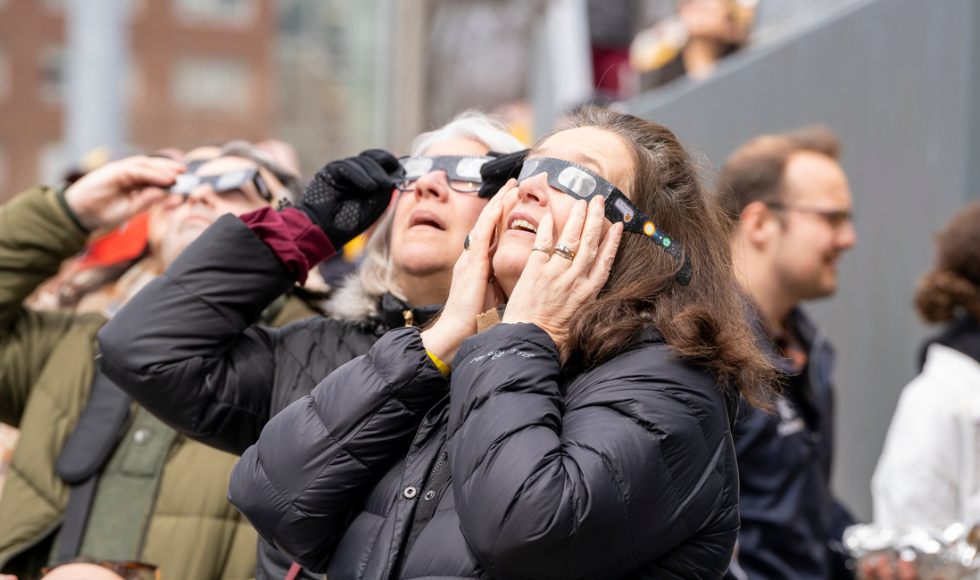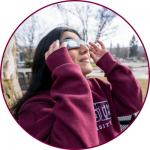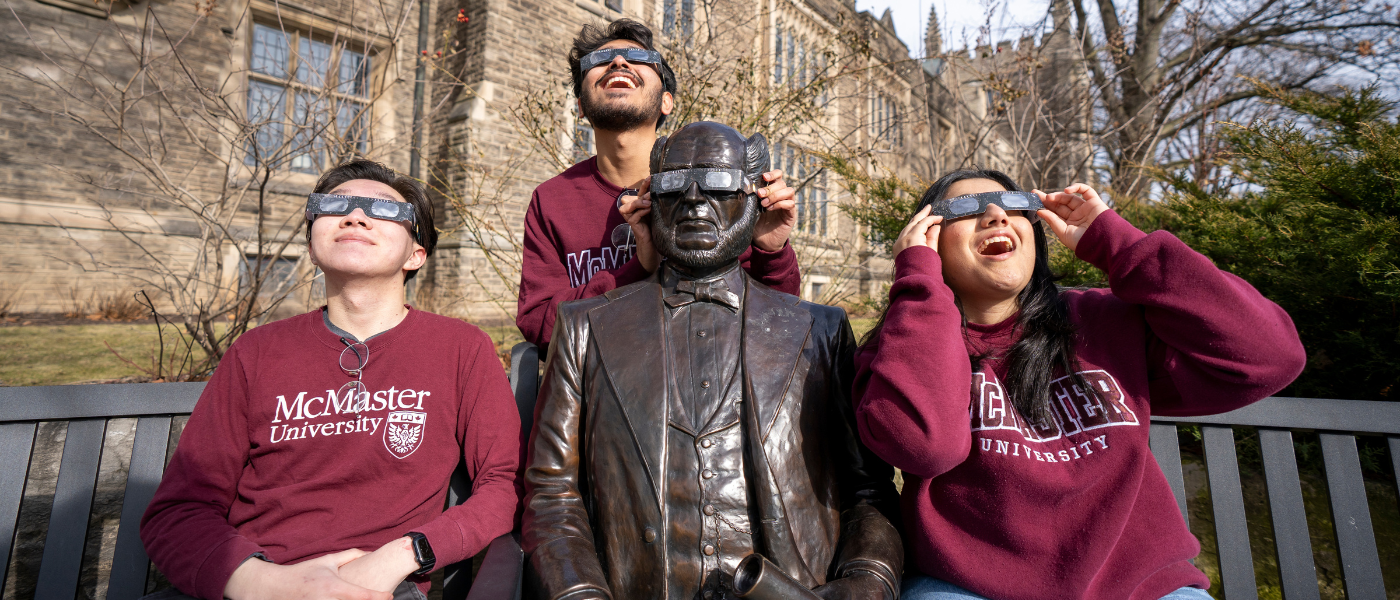
March 25, 2024
McMaster marks the total solar eclipse
Outreach events | Eclipse glasses | Viewing party
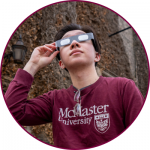
It’s a once-in-a-lifetime event that’ll have you looking up from your phone for at least a couple hours on Monday, April 8.
McMaster and Hamilton will be among the few places in North America to experience a total solar eclipse. This will be the first total solar eclipse over McMaster since Jan. 24, 1925. The next won’t happen until Oct. 26, 2144.
Faculty and students in the Department of Physics & Astronomy have been helping plan for and educating community members about the upcoming event.
Learn more below about their efforts to mark this rare celestial event!
Thousands of members of the community. 610,000 pairs of eclipse glasses. One incredible shared experience.
Relive the magic below!
Total solar eclipse: A once-in-a-lifetime experience at McMaster
It was a day — and for 96 seconds, a night — to remember.
Thousands of people gathered at Ron Joyce Stadium to experience a stunning total eclipse.
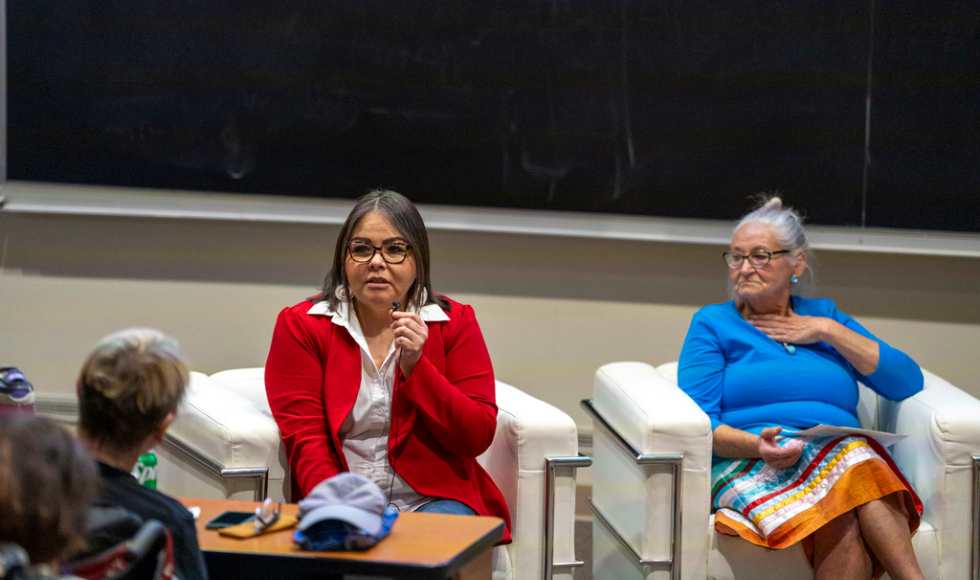
The greatest of love stories: Panel shares Indigenous perspectives on the eclipse and astronomy
More than 100 people attended the Indigenous Perspectives – Eclipse and Star Stories lecture Sunday afternoon at McMaster.
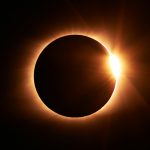 Total eclipse in the past: How astronomy and astrology went hand-in-hand in the Renaissance
Total eclipse in the past: How astronomy and astrology went hand-in-hand in the Renaissance
What did people in past centuries think when the sky suddenly went dark? History PhD student Tina Kocic shares some insights on Renaissance attitudes to science, superstition and the skies.
Click here for a Q and A with Kocic
Eclipse ambassador brings science into the community
Graduate student Nicole Mulyk is a member of a team of eclipse ambassadors who have reached thousands of community members through educational and outreach events in the lead-up to the total solar eclipse.
Learn more here.
Planetarium roadshow gives kids sneak peek at total eclipse
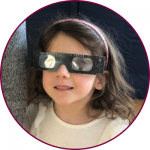
Our astronomy and physics scholars have been hard at work, serving as eclipse ambassadors, going out in the community to help educate others and share a preview of what to expect during the total solar eclipse.
Learn more about how they are sharing their love of space and science and inspiring future astrophysicists by taking the Faculty of Science’s portable planetarium on the road.
Meet Stewart Patch, 71-year-old undergrad and eclipse ambassador
Five decades after finishing university, Stewart Patch joined McMaster to pursue his second bachelor’s degree — this time in physics.
The 71-year-old, who is volunteering as an eclipse ambassador delivering talks in the community, shares what it’s like to be an undergrad again all these years later. Read here.
McMaster grad travels from Vienna to share in total solar eclipse experience
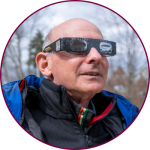 Louis Bruser knew that a total solar eclipse was worth travelling halfway around the world for.
Louis Bruser knew that a total solar eclipse was worth travelling halfway around the world for.
Witnessing a total solar eclipse has been called a once-in-a-lifetime event. Bruser’s now lucky enough to have seen two.
So, what is a total solar eclipse?
Ryan Cloutier can tell you!
The assistant professor in the Department of Physics & Astronomy and Polanyi Prize in Physics winner shares what a total solar eclipse is, how rare it is and what you can expect as the skies darken on April 8th.
How to safely watch a total solar eclipse
You should never look at the Sun without proper protection.
And for the upcoming total solar eclipse, you will need to take some extra precautions to protect your eyes.
Here’s what you need to know about watching a total solar eclipse safely.
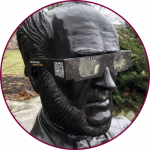 McMaster to host eclipse viewing party on April 8
McMaster to host eclipse viewing party on April 8
Free glasses, outreach events and an Instagram-worthy eclipse viewing party at the Ron Joyce Stadium are being planned to mark the total solar eclipse on April 8th.
Certified eclipse glasses have been made available free-of-charge for all students, faculty, staff and community partners, courtesy of the Office of the Provost and the Faculty of Science. Learn more here.
McMaster experts in the news
- McMaster University hosts solar eclipse watch party: Coverage from CHCH News
- “A multi-sensory experience:” PhD student and eclipse ambassador Veronika Dornan on CTV News
- “A once in a lifetime event:” Robert Cockcroft, director of McMaster’s William J. McCallion Planetarium, in conversation with The Hamilton Spectator
- “It’s really special:” Laura Parker, professor of physics, speaks to Global News
- “The Hamilton-Niagara area is the best place to see the eclipse:” Assistant Professor of physics & astronomy Rob Cockcroft shares his insights with the CBC
- Six Nations in prime location for once in a lifetime solar eclipse: Assistant professor of physics & astronomy Rob Cockcroft in the Two Row Times
From CBC: A drone’s-eye, timelapse view of the eclipse over McMaster’s campus

